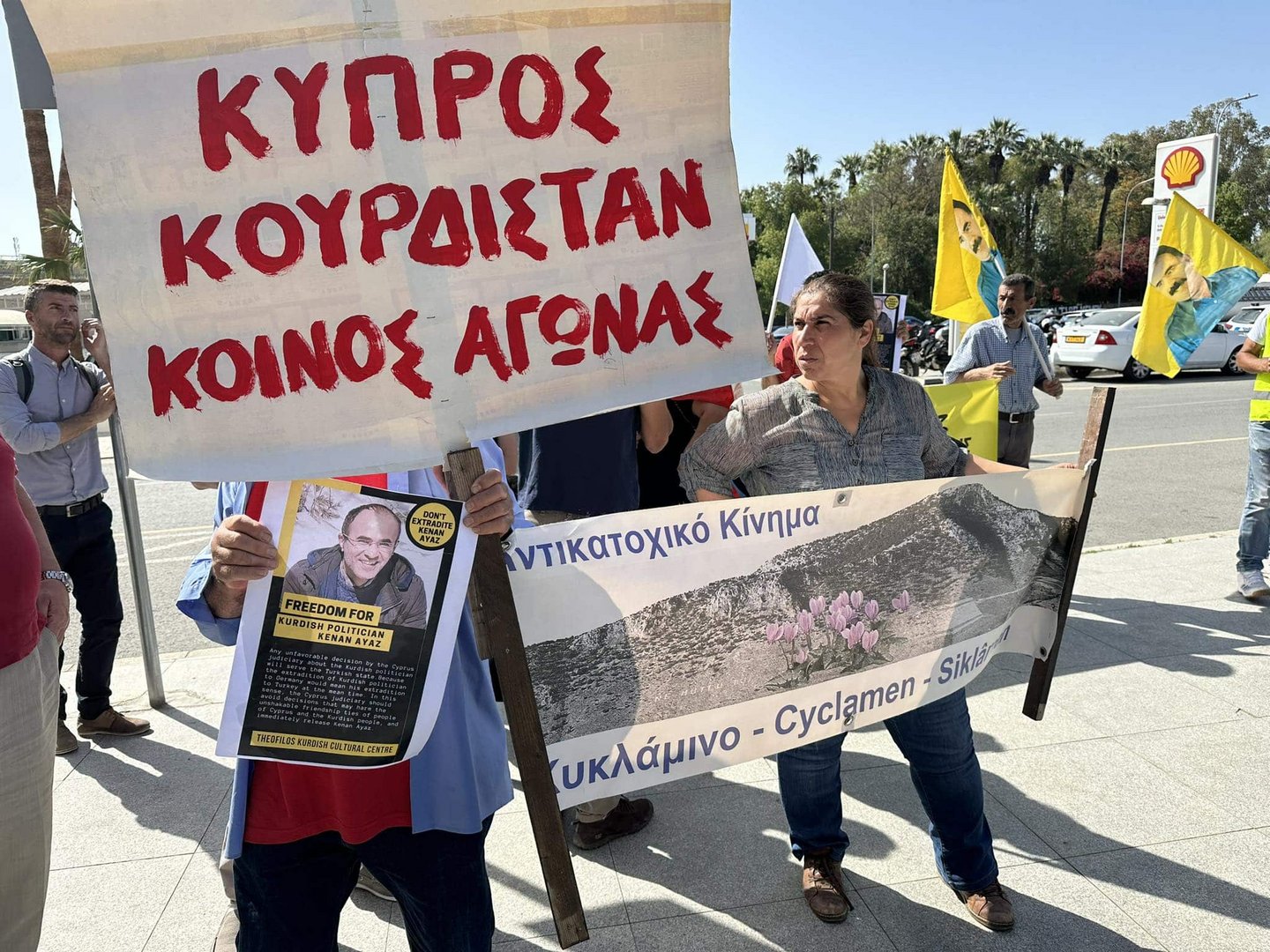The observatory in the case of Kurdish activist Kenan Ayaz on Monday once again called for his release from the central prison, arguing that the criminal offenses he was convicted of Germany did not constitute criminal offenses in the Republic of Cyprus.
“He was held in Turkish prisons without trial and any evidence of a criminal act for 17 years, he travelled throughout Europe, informed about the current situation in Kurdistan, the ongoing Kurdish struggle, (…) and even today he insists on a joint anti-occupation struggle of Cyprus and Kurdistan as the only path for the prosperity of our people,” observatory member Alekos Michaelides said at a press conference in Nicosia.
The group claims that Ayaz, who was convicted of being a member of a proscribed terrorist organisation in Germany, was prosecuted “on the orders of Turkish President Recep Tayyip Erdogan.”
Ayaz had been returned to Cyprus in early September to serve his remaining prison sentence on the island after he was detained in Germany for over two years.
He had previously lived in Cyprus as a recognised refugee for more than ten years and is set to be released in June 2026.
“We consider it necessary to reiterate that the judiciary and the executive did not treat Kenan as they should have, they did not protect a man who is fighting for Cyprus and whose life and freedom are threatened by the Turkish occupation state,” Michaelides continued.
Michaelides said that, despite the fact that Ayaz is due to leave prison in 2026, his fate remained “up in the air”.
He emphasised that any further delay to the activist’s release would place a “moral burden” on the Republic and would effectively acknowledge the conviction issued by the German court.
“Every day that passes and Kenan Ayaz is in prison is like the Republic of Cyprus itself recognising Turkey’s right to prosecute, condemn and oblige European Union countries to imprison Kurdish fighters,” he said.
Ayaz’s lawyer, Efstathios Efstathiou, added that Ayaz and his legal team had lodged an appeal against the conviction with the European Court of Human Rights in October 2025.
“Kenan was sentenced by the Hamburg higher regional court to 4 years and 3 months in prison, and the crucial point is that his conviction is not based on acts of violence or participation in criminal activity,” he said.
The lawyer said that Ayaz’s conviction was based primarily on his participation in nine peaceful demonstrations and cultural events of interest to the Kurdish community.
He reiterated that these events were legal and public and fully protected by the European Convention on Human Rights.
The German court itself, he said, recognised Ayaz’ participation in these events as legal, however considered that, they could acquire a criminal character as they were committed in a specific political context.
“For this very reason, there was a need to appeal to the European Court of Human Rights,” Efstathiou said, referring to Ayaz’ case as a “politically motivated prosecution.”
AKEL MP, Giorgos Koukoumas spoke of Ayaz’ case as “outrageous.”
“The Republic of Cyprus should never have executed the European arrest warrant,” he said.
Koukoumas said that Ayaz had been imprisoned at the request of Erdogan and the Turkish government, not because he had been found guilty.
He stressed that EU member states were obliged to refuse to execute a European arrest warrant if there was a risk of persecution based on political opinion.
Former Greens leader George Perdikis equally expressed his support for the immediate release of Ayaz.
“He was unjustly convicted in Germany and we are keeping him in prison,” he said, stressing that Ayaz had been sent to be trialled in Germany despite being considered innocent as per the Cypriot legal system.
Ayaz was arrested at Larnaca airport in March 2023 after a European arrest warrant was issued by Germany.
A German court in September 2024 sentenced Ayaz to four years and three months in prison for his alleged membership of the Kurdish Workers’ Party (PKK).
The 50-year-old was accused of acting as a “regional leader” in the party and of being involved in the organisation of events and gatherings intended for the dissemination of propaganda.
The PKK has been listed as a terrorist organisation in the European Union since 2002, when the EU General Court rejected the group’s attempt for removal from the terrorist list and the lifting of financial restrictions.
Turkey has for decades declared the group to be one of the country’s greatest security threats.






Click here to change your cookie preferences